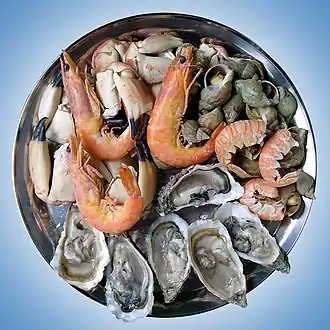| Conger | |
|---|---|
 | |
| Anago in an aquarium. | |
| Scientific classification | |
| Kingdom: | |
| Phylum: | |
| Class: | |
| Order: | |
| Family: | |
| Genus: | Oken, 1817 |
| Species | |
|
See text. | |
Anago (穴子, or アナゴ) is the Japanese word for salt-water eels, normally referring to ma-anago (Conger myriaster). Ma-anago are used for a seafood dish in Japan. They are often simmered (sushi) or deep-fried (tempura), compared to unagi (freshwater eels) which are usually barbecued with a sauce (kabayaki). Anago is also slightly less rich and oily than unagi. Anago has a very soft texture and sweet taste.
Species
- Chin-anago (チンアナゴ) Heteroconger hassi (Klausewitz & Eibl-Eibesfeldt 1959)[2]
- Goten-anago (ゴテンアナゴ) Ariosoma anago, Anago anago or Conger anago (Temminck et Schlegel, 1846)[3]
- Kiri-anago (キリアナゴ) Conger cinereus (Rüppell, 1830)[4]
- Kuro-anago (クロアナゴ) Conger japonicus (Bleeker, 1879)[5]
- Ma-anago (マアナゴ) Conger myriaster (Brevoort, 1856)[6]
- Shinjyu-anago (シンジュアナゴ) Gorgasia japonica (Abe, Asai & Miki 1977)[7]
References
- ↑ Sepkoski, Jack (2002). "A compendium of fossil marine animal genera". Bulletins of American Paleontology. 364: 560. Archived from the original on 2011-07-23. Retrieved 2007-12-25.
- ↑ "Heteroconger hassi (Klausewitz & Eibl-Eibesfeldt 1959)". FishWise. Archived from the original on 2011-03-03.
- ↑ "Ariosoma anago (Schlegel & Temminck 1846)". FishWise. Archived from the original on 2011-07-20.
- ↑ "Conger cinereus Rüppell 1830". FishWise. Archived from the original on 2011-07-20.
- ↑ "Conger japonicus Bleeker 1879". FishWise. Archived from the original on 2011-07-20.
- ↑ Hosking, Richard (1996). A dictionary of Japanese food: ingredients & culture. Tuttle Publishing. p. 22. ISBN 0-8048-2042-2.
- ↑ "Gorgasia japonica Abe, Asai & Miki 1977". FishWise. Archived from the original on 2011-07-20.
This article is issued from Wikipedia. The text is licensed under Creative Commons - Attribution - Sharealike. Additional terms may apply for the media files.

